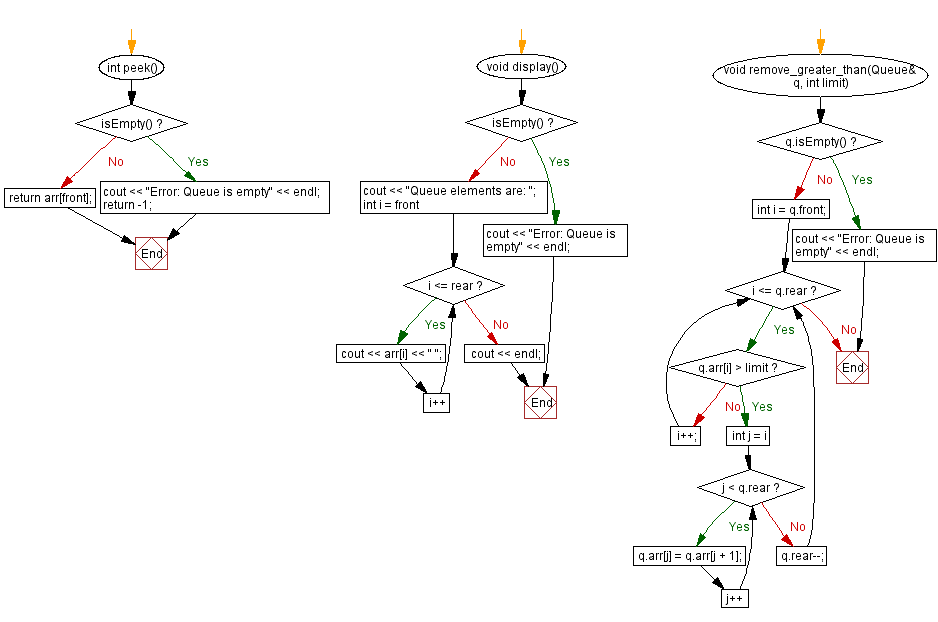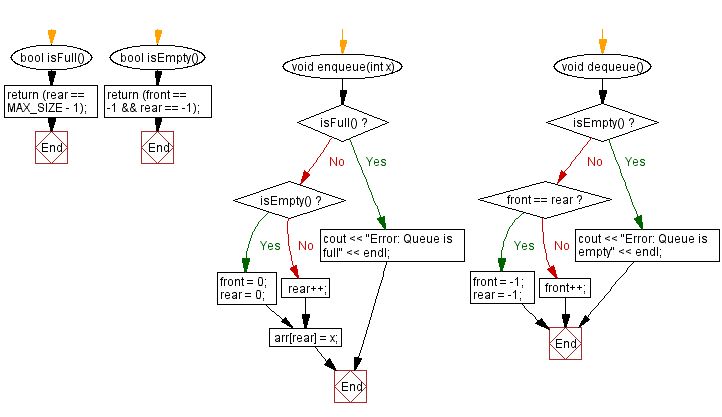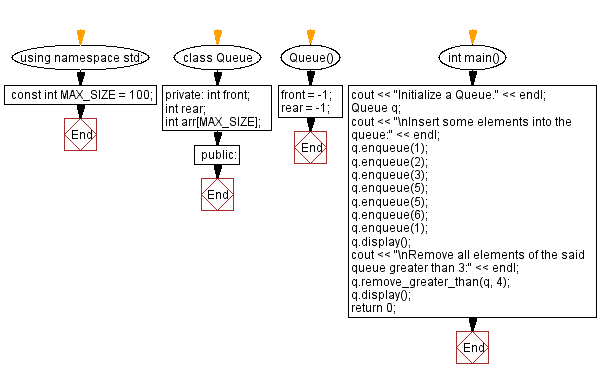C++ Queue Exercises: Remove all elements greater than a number from a queue
18. Remove All Elements Greater Than a Number from a Queue
Write a C++ program to remove all elements greater than a number from a queue.
Sample Solution:
C Code:
#include <iostream> // Including the necessary library for input and output operations
using namespace std;
const int MAX_SIZE = 100; // Maximum size for the queue
class Queue {
private:
int front; // Front of the queue
int rear; // Rear of the queue
int arr[MAX_SIZE]; // Array to store queue elements
public:
Queue() {
front = -1; // Initializing front index to -1
rear = -1; // Initializing rear index to -1
}
bool isFull() {
return (rear == MAX_SIZE - 1); // Check if the queue is full
}
bool isEmpty() {
return (front == -1 && rear == -1); // Check if the queue is empty
}
void enqueue(int x) {
if (isFull()) {
cout << "Error: Queue is full" << endl; // Display error if the queue is full
return;
}
if (isEmpty()) {
front = 0;
rear = 0;
}
else {
rear++;
}
arr[rear] = x; // Add an element to the rear of the queue
}
void dequeue() {
if (isEmpty()) {
cout << "Error: Queue is empty" << endl; // Display error if the queue is empty
return;
}
if (front == rear) {
front = -1;
rear = -1;
}
else {
front++;
}
}
int peek() {
if (isEmpty()) {
cout << "Error: Queue is empty" << endl; // Display error if the queue is empty
return -1;
}
return arr[front]; // Return the element at the front of the queue
}
void display() {
if (isEmpty()) {
cout << "Error: Queue is empty" << endl; // Display error if the queue is empty
return;
}
cout << "Queue elements are: ";
for (int i = front; i <= rear; i++) {
cout << arr[i] << " "; // Display all elements in the queue
}
cout << endl;
}
// Function to remove elements greater than a given limit
void remove_greater_than(Queue& q, int limit) {
if (q.isEmpty()) {
cout << "Error: Queue is empty" << endl; // Display error if the queue is empty
return;
}
int i = q.front;
while (i <= q.rear) {
if (q.arr[i] > limit) {
for (int j = i; j < q.rear; j++) {
q.arr[j] = q.arr[j + 1]; // Remove element by shifting subsequent elements
}
q.rear--; // Decrement the rear pointer
}
else {
i++;
}
}
}
};
int main() {
cout << "Initialize a Queue." << endl;
Queue q;
cout << "\nInsert some elements into the queue:" << endl;
q.enqueue(1);
q.enqueue(2);
q.enqueue(3);
q.enqueue(5);
q.enqueue(5);
q.enqueue(6);
q.enqueue(1);
q.display();
cout << "\nRemove all elements of the said queue greater than 3:" << endl;
q.remove_greater_than(q, 4); // Remove elements greater than 3
q.display();
return 0;
}
Sample Output:
Initialize a Queue. Insert some elements into the queue: Queue elements are: 1 2 3 5 5 6 1 Remove all elements of the said queue greater than 3: Queue elements are: 1 2 3 1
Flowchart:



For more Practice: Solve these Related Problems:
- Write a C++ program to remove all elements from a queue that exceed a user-specified threshold.
- Write a C++ program to filter a queue by dequeuing elements greater than a given value and reassemble the queue.
- Write a C++ program to traverse a queue and delete any element that is larger than a defined limit.
- Write a C++ program to create a new queue containing only elements less than or equal to a given number.
Go to:
PREV : Remove All Duplicate Elements from a Queue.
NEXT : Concatenate Two Queues.
CPP Code Editor:
Contribute your code and comments through Disqus.
What is the difficulty level of this exercise?
